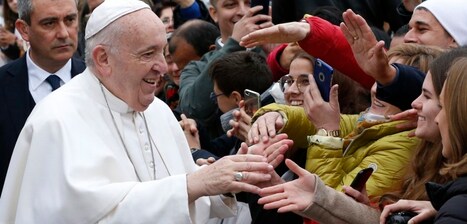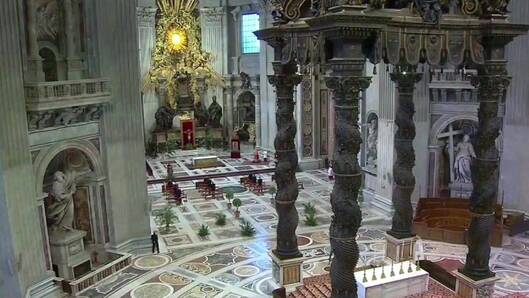 Pope Francis on Ash Wednesday 2020 Pope Francis on Ash Wednesday 2020 The timeline of 2020 and the liturgical calendar have had some interesting synergy. This year Lent began on Feb. 26, and in America, the CDC also announced the first US coronavirus case of unknown origin in California (the state I live in). Without any travel history or exposure to another known infected person, this was the first case of possible “community spread.” Coronavirus was already rising to the front of people’s minds and, as is often the case, they looked to their political and spiritual leaders for guidance. However, churches were still open for Catholics to receive their ashes and there was no fear or messaging against doing so. On this first day of Lent, President Trump at a White House briefing said, “So we’re at the low level. As they get better, we take them off the list, so that we’re going to be pretty soon at only five people. And we could be at just one or two people over the next short period of time. So we’ve had very good luck.” In short: We have it under control. Lent asks those practicing to pray, fast, and give alms. Lenten practices here in America have become very individualized—many choosing to give up something like sweets or adding something like daily exercise—often it’s less a spiritual exercise and more an attempt to lose a few pounds. Which, to be fair, if you are looking at your physical body as a temple loaned to you by the divine, it is important that a certain amount of care is devoted to it…This is usually how I have approached Lent—trying to use it as a period of self-improvement. But the concept of “Self” is key here. We rely on our personal discipline. For most of us, the “self” is comprised of our ego; ego being most concerned with visible markers of success. We want to look like we are in control, productive, and unfazed. We want others to admire us…we certainly want to be enviable (rather than full of envy ourselves). This period of ‘giving things up’ has become about “showing” how disciplined we are. But as the 40 days of Lent passed in 2020, everyone, not just Catholics, have been asked to give things up. I believe that the things we’ve recently been asked to give up (leaving our homes, gathering with friends) have sparked fear and anguish because it directly challenges our illusion of control. During this time of ‘sheltering in place,’ we are asked to confine our own healthy bodies to protect our neighbors from being infected if we are, in fact, carriers without knowing it. There is fear, and boredom to various degrees. Cycles of tensions exist, or cycles of abuse in some homes. Some people have backyards to stretch out in. Some people have pools. Some people are crammed into dwellings with double, or triple the intended occupancy. Some families are living in cars. Some outside. None of this is new and none of it has changed due to the pandemic. Jesus preached beyond “what” is practiced. He was very conscientiousous to speak about how we practice. “And when you pray, do not be like the hypocrites, for they love to pray standing in the synagogues and on the street corners to be seen by others. Truly I tell you, they have received their reward in full. But when you pray, go into your room, close the door and pray to your Father, who is unseen. Then your Father, who sees what is done in secret, will reward you. Matthew 6:5-6 New International Version (NIV) He goes on to say not to make a big to-do about fasting. These faith practices are private, not for show. What I’ve noticed recently is the uptick in online performances of social distancing. Soapbox speeches, and shaming for those not wearing masks…then shaming those for wearing masks at the expense of first responders. Speeches that wag fingers at those not staying home (and then, perversely, making exceptions for the folks they’re visiting). Coming to the close of Lent, recalling Jesus’ directions on how to practice faith…it got me wondering, what does the practice of faith actually look like, from the outside? The holy books are full of stories, characters, and prose written in such a way that begs interpretation (whether you believe those texts should be contextualized historically or not). But some of the simplest directives are probably why the books have had such longevity: Do not murder. Do not commit adultery…While folks have worked hard to interpret loopholes they are pretty straightforward. But, as I’ve watched the continuous and mounting politicization of this global tragedy—one that is having consequences for everyone but is affecting the most vulnerable in a much more intense and lasting way—I have tried to focus on my own practices. Or rather, my own “how.” For many of us, Lent, far from being a release from control, has been a practice of being in control. Our outward practices are proof to our community… ”I am good. I am worthy. I have given up alcohol” or “sugar” or “smoking” or “caffeine” or…”fill in the blank”…So often these performances supersede the inner work which is harder. Meditating on questions like: What is sacrifice? How do I simplify my life to take only what I need? How have I shown up for the poor, the prisoners, those who have less than I do? What is the meaning of my hours on this earth? How do I live (not perform) my values? In the Gospel, Jesus spoke about the wise people listening to his guidance being like those building their homes on rock. Meanwhile, those who listen but do not act “will be like those who’ve built on sand.” When the rains and winds come, the house will collapse, ruined. (Mt 7:26-27) Some of us, in the increased politicization of our country, have traded our own introspective processes for voices we believe “represent” our beliefs. Republicans might look to Trump or Limbaugh, Democrats might look to Pelosi or Sanders, and Catholics…we might look to Pope Francis. And I think this is fine…as long as we don’t stop there. Today, April 9th, 2020, is Holy Thursday. This is when Catholics commemorate the last meal Jesus had with his disciples; when he gave them the tools of being in community—sharing words, and bread and wine together. Pope Francis made sure to note today that 60 priests have died in Italy, providing bodily and spiritual care for the sick. They showed up for their community, no matter the cost. Holy Thursday also commemorates the day when God incarnate was, himself, very much afraid and lonely and yet still found a way to be in service. The human embodiment of the divine washed the feet of his disciples, whether they were “worthy” or not. What a statement. What a take away for those of us who, on April 9, 2020 find ourselves afraid and lonely! What might we still be able to offer the people we are confined with and the people in our communities? Perhaps it is time that we renew our concern with our own sense of discernment. Instead of looking to our leaders to tell us what to do, perhaps it is time that we look inwards to decide how we want to be. How will we show up for our families and for our neighbors? How will we be in service to “the least of these”: the hungry, the sick, the poor, the imprisoned…the strangers? Are we “social distancing” out of fear for our own bodies? Or care for theirs? Perhaps, if we are able to move with our fear, as Jesus managed to do, we can find a way to transcend that fear in the service of others. aises-priests-during-mass-in-coena-domini-in-nearly-empty-st-peters-basilica-full-text/ And, if we can, what an extraordinary Lenten season this will have been.
0 Comments
Leave a Reply. |
Danika Sudik...
Categories:
|

 RSS Feed
RSS Feed